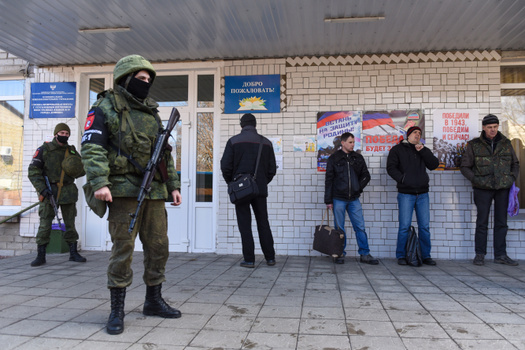
Stay hidden or get drafted How the breakaway regions of eastern Ukraine are forcing local men into the military
Мы говорим как есть не только про политику. Скачайте приложение.
On February 17, the breakaway governments in Ukraine’s Donetsk and Luhansk regions began spreading claims of a massive Ukrainian artillery attack on the territories they control. The leaders of the self-declared Donetsk and Luhansk “people’s republics” used these claims not only to evacuate women and children into Russia but also to implement a universal conscription policy among men between 18 and 55 for “the protection of the Donbas and of all Russian people.” On February 23 and 24, the self-proclaimed republics reported a successful military recruitment campaign that allegedly brought in many new volunteer troops. However, local residents told Meduza that soldiers are conducting raids to sweep the streets for potential conscripts.
Please note: This article was first published in Russian on February 25, 2022.
The self-proclaimed “Donetsk People’s Republic” (DNR) instituted its universal male conscription policy during an emergency meeting on February 19—even before Russian President Vladimir Putin had announced his recognition of Ukraine’s breakaway governments and initiated a military invasion of the rest of Ukraine. “We will defend the Donbas and all Russian people,” announced DNR leader Denis Pushilin as he signed the mass mobilization order. “I call on all the men of our republic who are capable of holding a weapon in their hands to rise up and defend their families, their children, their wives, and mothers. Together, we will achieve the victory that we desire and need,” Pushilin declared.
Soon afterward, the self-proclaimed “Luhansk People’s Republic” (LNR) ordered all its draft-eligible residents to report immediately to mobilization points organized by district-level conscription offices. Natalya Pshenichnaya, who chairs the ethics committee of the separatist parliament in the DNR, said the mass mobilization had been triggered by “a direct threat of aggression against the DNR by the Armed Forces of Ukraine.”
In his own executive order, LNR leader Leonid Pasechnik prohibited all men aged 18 to 55 from leaving the self-declared republic and ordered them to report for military duty. Residents who had not received individual draft notices were required to appear at a local mobilization point regardless. Pasechnik’s order also expropriated automobiles from civilians and organizations under the LNR’s control. A volunteer mobilization campaign was declared for men over 55.
As both breakaway leaders issued their conscription orders, patriotic slogans like “All must defend the Motherland! The Donbas is our land!” began appearing on local billboards. Residents of separatist-controlled areas started getting SMS messages from military commissars telling them to fulfill their “sacred duty as men”: namely, to “report to a mobilization point and join the ranks of the defenders.” Kyiv, according to these messages, had decided to open “an offensive on the republic.” LNR Attorney General Sergey Gorenko announced, “In this difficult time, we must band together and make the junta in Kyiv face a proper resistance.” He added that any men who evade conscription could face “administrative and criminal liability.”
On February 22, Russia’s Vladimir Putin recognized the DNR and LNR as independent states, and the Federation Council gave him permission to advance Russian troops into the Donbas and beyond. On February 24, Putin also announced what he called a “special military operation,” de facto declaring war on Ukraine.
Nevertheless, not all men living under the LNR’s and DNR’s control were willing to mobilize and fight against Ukraine.
Go to war or go to jail
Olga is from Luhansk (a number of sources in this story asked to be identified by first name only). She makes a living selling goods at the local market. The city feels empty in recent days, she told Meduza. Most of her customers now are women, and the men going grocery shopping tend to be over 55. Compulsory conscription is underway in Luhansk, Olga explained: soldiers have literally been picking military-aged men off the streets. If someone refuses to come quietly, the standard response is “if you don’t go to war, you’ll go to jail,” she said. Whether or not men have actually been arrested for evading conscription in the breakaway republics is unknown.
The soldiers put the men they find into buses and take them to recruitment centers. Olga has heard that some of them have been sent from there directly into combat—sometimes without even being issued a uniform.
Some of Olga’s acquaintances have already been conscripted: some of them got draft notices, while soldiers took others from their homes.
One group of residents in the Luhansk region has organized a petition to stop the LNR’s conscription campaign. The petition had about 1,650 signatures at the time of this publication—a tiny fraction of the total population living under the LNR, which numbers at about half a million.
“People are split on this question. Some people are staying home or leaving the city, but I wouldn’t say everyone is trying to hide. We’ve also had a whole lot of volunteers of all ages. You’ve got 18-year-olds volunteering to go, and you’ve got 64-year-olds, too,” Olga said.
Discussions on various local social media pages in the breakaway republics indicate that men who receive a draft notice have been going to conscription offices only to be put down as “volunteers.” Men who arrive at an office without a notice have been asked to go home and “wait” for one to arrive.
Alexander, who is 30 years old, lives in a residential neighborhood of Luhansk. He said that police officers with “patrol unit” printed on their vehicles have been rounding up male passersby between 18 and 55 in the surrounding streets. Alexander himself has not received a draft notice—he thinks the conscription office might have lost his papers. “There’s only one reason I haven’t gotten caught: I’ve been careful, and I almost never leave the house,” he said. “Yes, there are men in hiding right now. It’s mostly women and elderly people walking around the city—you don’t see many young people out and about.”
Alexander’s cousin, whom he declined to name, was taken right from a nearby market when he ventured outside his house to buy groceries. Alexander told Meduza that his brother and one of his friends had also encountered soldiers who asked for their identification documents and then asked whether they were already in service. When the pair answered in the negative, the soldiers stopped asking questions, forced both young men into a car, and drove them to a conscription center for a medical examination. When neither Alexander’s brother nor his friend passed the exam, they were brought back into the city.
Alexander feels that he is “more Russian than Ukrainian,” but he also feels no enmity for the Ukrainian people and no desire to fight “against other guys who were also just forced to go fight in this war.” He said, “In the LNR and the DNR, there’s a pretty large number of people who consider themselves Ukrainian. Plus, I have a lot of friends and acquaintances who live on Ukrainian territory, and we have positive, friendly relationships.”
Away from the front lines
Elena (name changed) said her father got his draft notice even before Putin recognized the Donbas’s breakaway republics on February 21. He was called up “in connection with deteriorating conditions in the republic and increased military activity on the part of Ukraine.”
“We needed help from reservists so that if the Ukrainian army got through to our territory, we’d be able to defend the city,” Elena told Meduza. Her 50-year-old father didn’t want to join the military, but he still went to the conscription office, where he was immediately mobilized. Later on, he called his family and told them he was already in uniform. Now, he calls every day.
“He says everything’s okay and nobody is taking them to the front lines. He says it’s just a typical training combine at a military base. They gave him clothes, they’re giving him food,” Elena said. She has heard that men in Donetsk are still getting new draft notices as the DNR gathers more and more people at its military bases. Some of them have been allowed to come home briefly and collect their belongings.
Another Donetsk resident confirmed to Meduza that mobilized men aren’t being sent to the front lines: “We have full-fledged conscription centers and military bases where they send the new recruits. They’re being sorted into rear guard units. They’re not being sent to the front.”

Women in the Donbas have been collecting food and sending it to conscription centers in an effort to support the new recruits. “Just the day before yesterday, we sent food over to our men… Potatoes, lard, onions, boiled eggs, all kinds of cookies—everyone brought what they could,” wrote Galina, a Donetsk resident, to other local women on the social media site VKontakte. “You wouldn’t believe it if you saw these women pulling their bags along on wheelbarrows and bicycles to collection points that they organized themselves. We also collected money—however much people were able to give.”
Draft exceptions aren’t being enforced
Denis Pushilin, the head of the self-proclaimed DNR, has required every commercial enterprise in the territory to mobilize half of its military-aged employees. This demand raised concerns among locals that they might be left without essential workers who maintain the area’s roads, heating systems, and other infrastructure. Companies have been working with the separatist government to exempt some of their workers from conscription in hopes of continuing their work.
One Donetsk resident, an entrepreneur who asked to remain anonymous, told Meduza that these exemptions don’t always help. He himself had only 20 or 30 percent of his workforce left—the rest had been drafted. “A lot of places aren’t paralyzed, but it’s really hard for them to function, especially since people are still being nabbed right off the streets,” he explained.
Ekaterina Nikutina’s husband is a 27-year-old mechanic at the Southern Mining and Smelting Combine in Yenakievo, northeast of Donetsk. On February 24, while the Russian military advanced, it was a normal workday at the combine. Ekaterina’s husband had no qualms about going out to work because he and his colleagues had been issued documents several days before that exempted the combine’s workers from military service.
But later that same day, Ekaterina got a phone call that began, “Don’t get upset—they’ve called me up to the conscription office. They’re taking me in.”
“I started panicking. How could this be possible? The factory workers had gotten documents to stop them from being taken away. But even that wasn’t enforced in the end,” Ekaterina said. Men from all around the factory were conscripted that day—three or four employees from each workshop.
Ekaterina’s husband returned home before long because he failed the vision section of his medical exam. “And the rest of the people they took,” she said, “they’re all gone.”
Story by Sasha Sivtsova, Anastasia Yakoreva, and Gleb Golod
Translation by Hilah Kohen